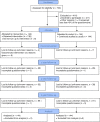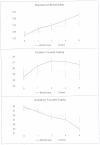Six-year positive effects of a mindfulness-based intervention on mindfulness, coping and well-being in medical and psychology students; Results from a randomized controlled trial
- PMID: 29689081
- PMCID: PMC5916495
- DOI: 10.1371/journal.pone.0196053
Six-year positive effects of a mindfulness-based intervention on mindfulness, coping and well-being in medical and psychology students; Results from a randomized controlled trial
Abstract
Longitudinal research investigating the enduring impact of mindfulness training is scarce. This study investigates the six-year effects of a seven-week mindfulness-based course, by studying intervention effects in the trajectory of dispositional mindfulness and coping skills, and the association between those change trajectories and subjective well-being at six-year follow-up. 288 Norwegian medical and psychology students participated in a randomized controlled trial. 144 received a 15-hour mindfulness course over seven weeks in the second or third semester with booster sessions twice yearly, while the rest continued their normal study curricula. Outcomes were subjective well-being, and dispositional mindfulness and coping assessed using the Five Facet Mindfulness Questionnaire and the Ways of Coping Checklist. Analyses were performed for the intention-to-treat sample, using latent growth curve models. At six-year follow-up, students receiving mindfulness training reported increased well-being. Furthermore, they reported greater increases in the trajectory of dispositional mindfulness and problem-focused coping along with greater decreases in the trajectory of avoidance-focused coping. Increases in problem-focused coping predicted increases in well-being. These effects were found despite relatively low levels of adherence to formal mindfulness practice. The findings demonstrate the viability of mindfulness training in the promotion of well-being and adaptive coping, which could contribute to the quality of care given, and to the resilience and persistence of health care professionals.
Trial registration: Clinicaltrials.gov NCT00892138.
Conflict of interest statement
Figures



References
-
- Irving JA, Dobkin PL, Park J. Cultivating mindfulness in health care professionals: A review of empirical studies of mindfulness-based stress reduction (MBSR). Complementary Therapy and Clinical Practice. 2009;15(2):61–6. - PubMed
-
- Khoury B, Sharma M, Rush SE, Fournier C. Mindfulness-based stress reduction A meta-analysis. J Psychosom Res. 2015;78(6):519–28. doi: 10.1016/j.jpsychores.2015.03.009 - DOI - PubMed
-
- Virgili M. Mindfulness-based interventions reduce psychological distress in working adults: A meta-analysis of intervention studies. Mindfulness. 2015;6(2):326–37.
-
- Bohlmeijer E, Prenger R, Taal E, Cuijpers P. The effects of mindfulness-based stress reduction therapy on mental health of adults with a chronic medical disease: A meta-analysis. J Psychosom Res. 68(6):539–44. doi: 10.1016/j.jpsychores.2009.10.005 - DOI - PubMed
-
- Demarzo MM, Montero-Marin J, Cuijpers P, Zabaleta-Del-Olmo E, Mahtani KR, Vellinga A, et al. The efficacy of mindfulness-based interventions in primary care: A meta-analytic review. Annals of family medicine. 2015;13(6):573–82. doi: 10.1370/afm.1863 - DOI - PMC - PubMed
Publication types
MeSH terms
Associated data
LinkOut - more resources
Full Text Sources
Other Literature Sources
Medical

